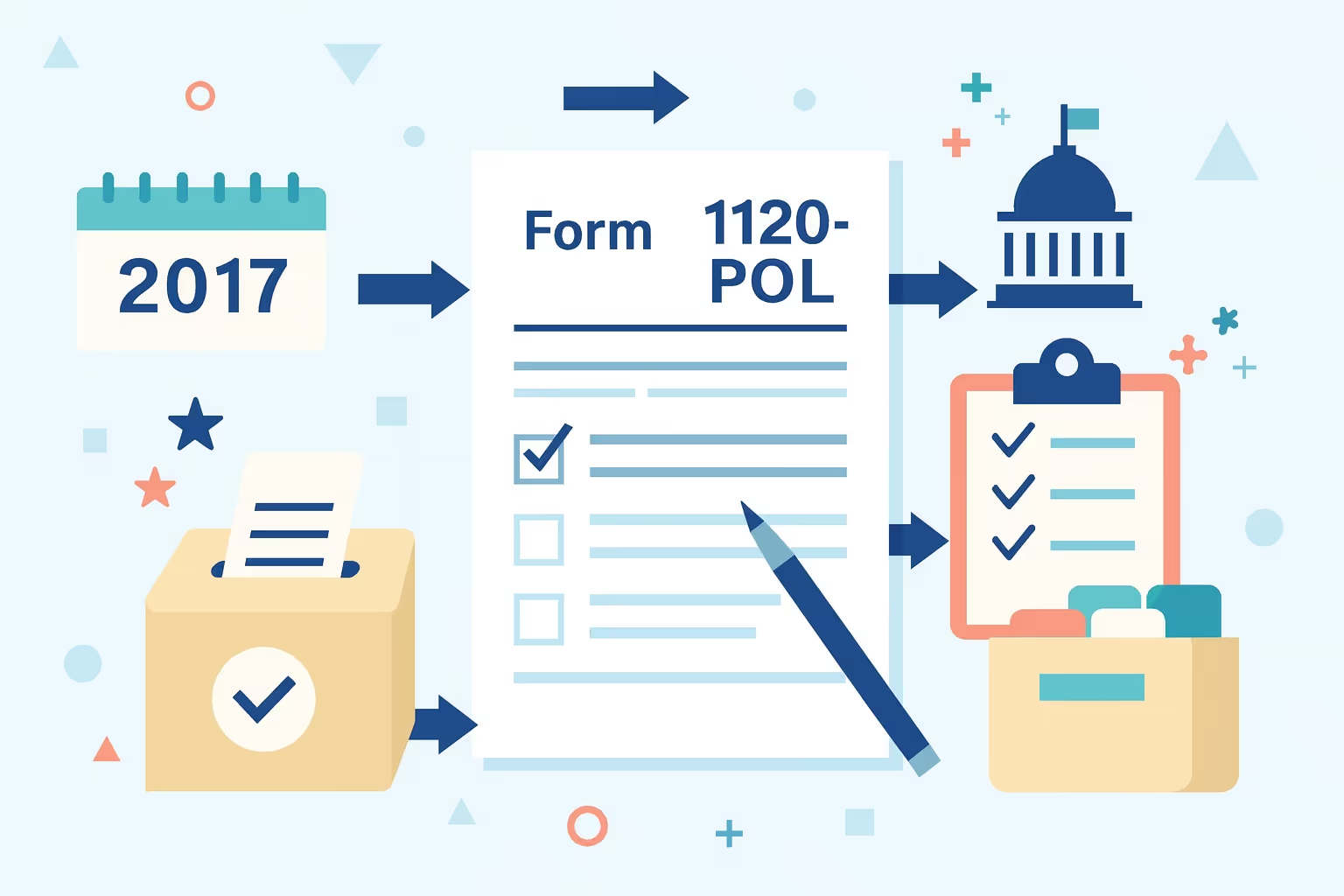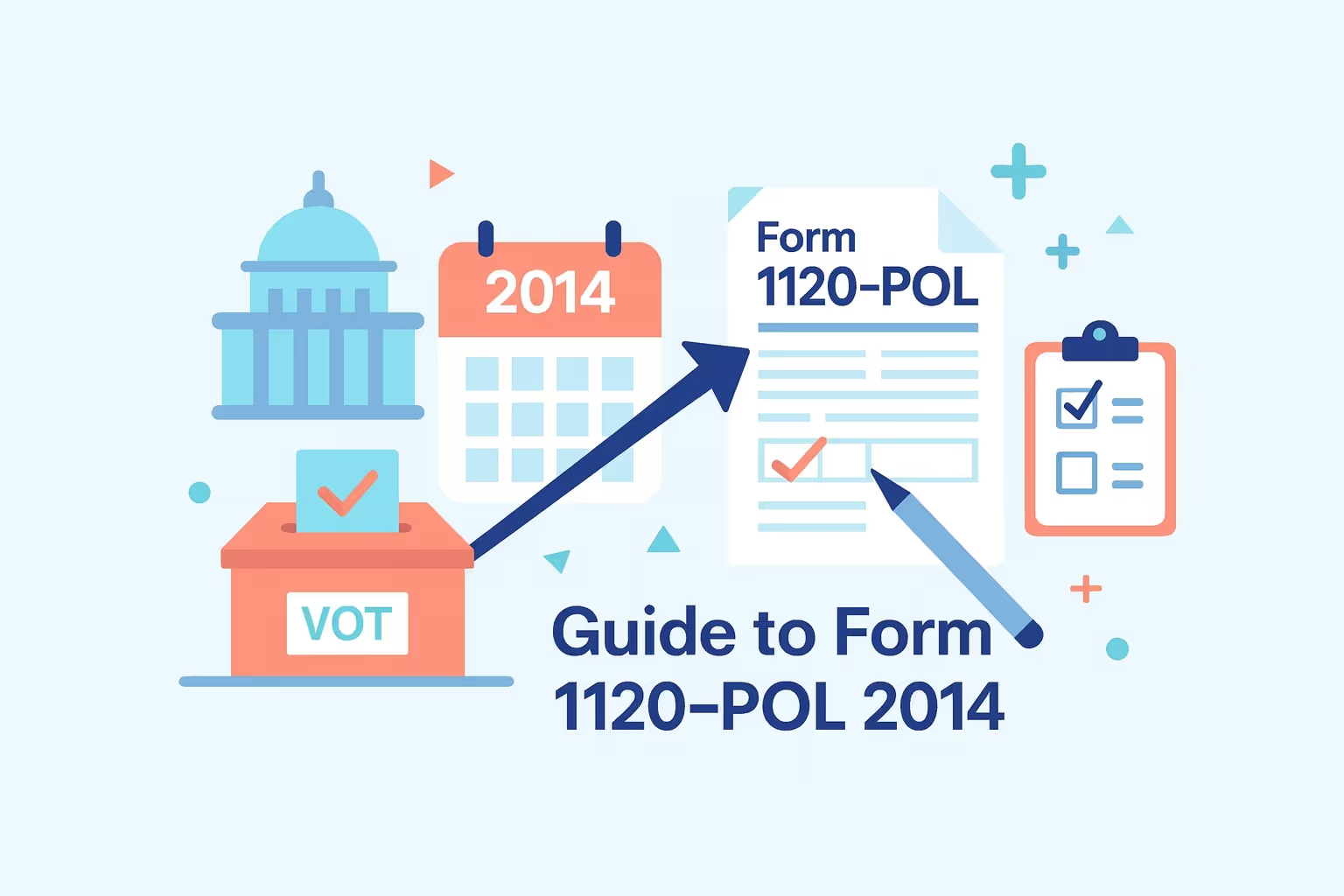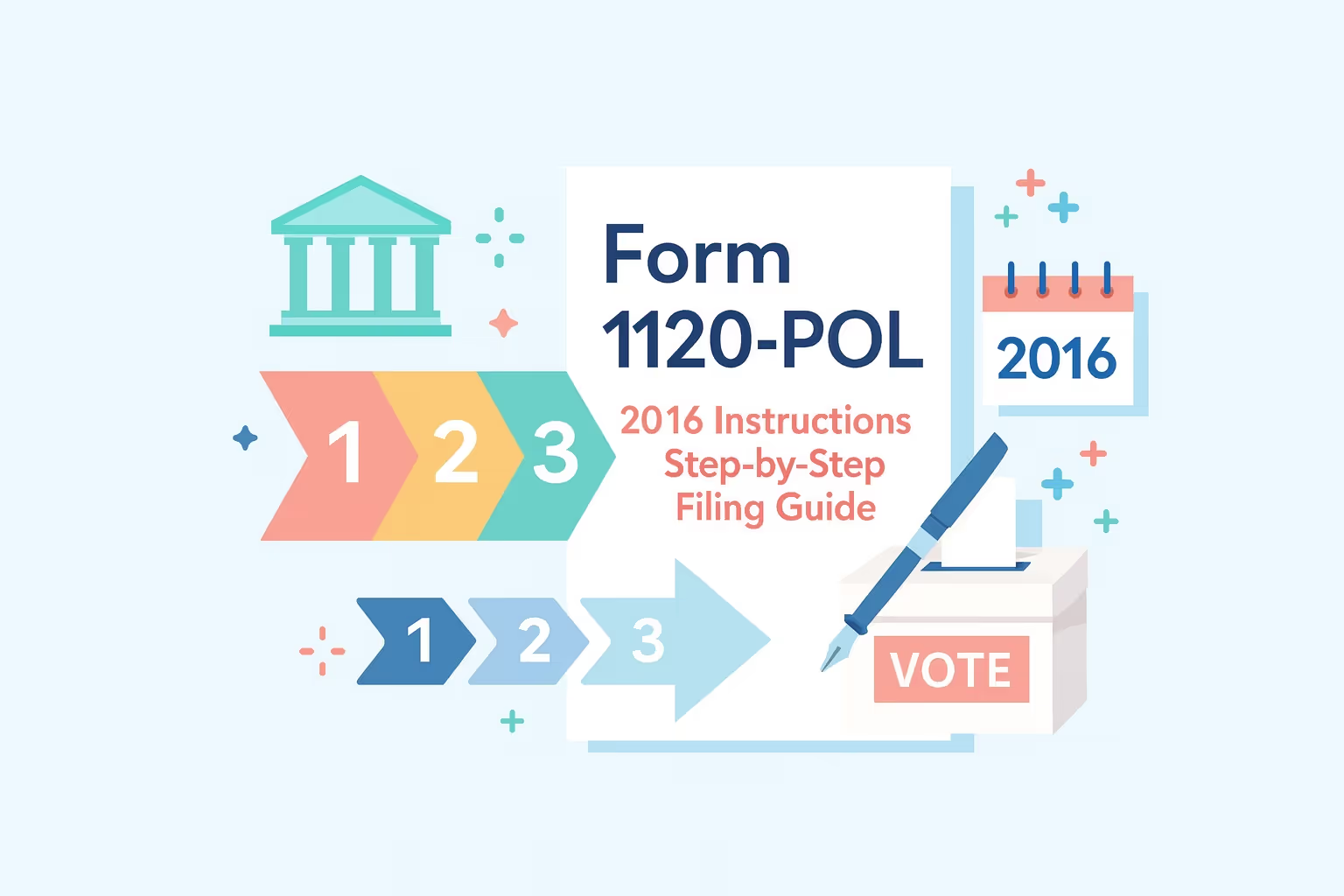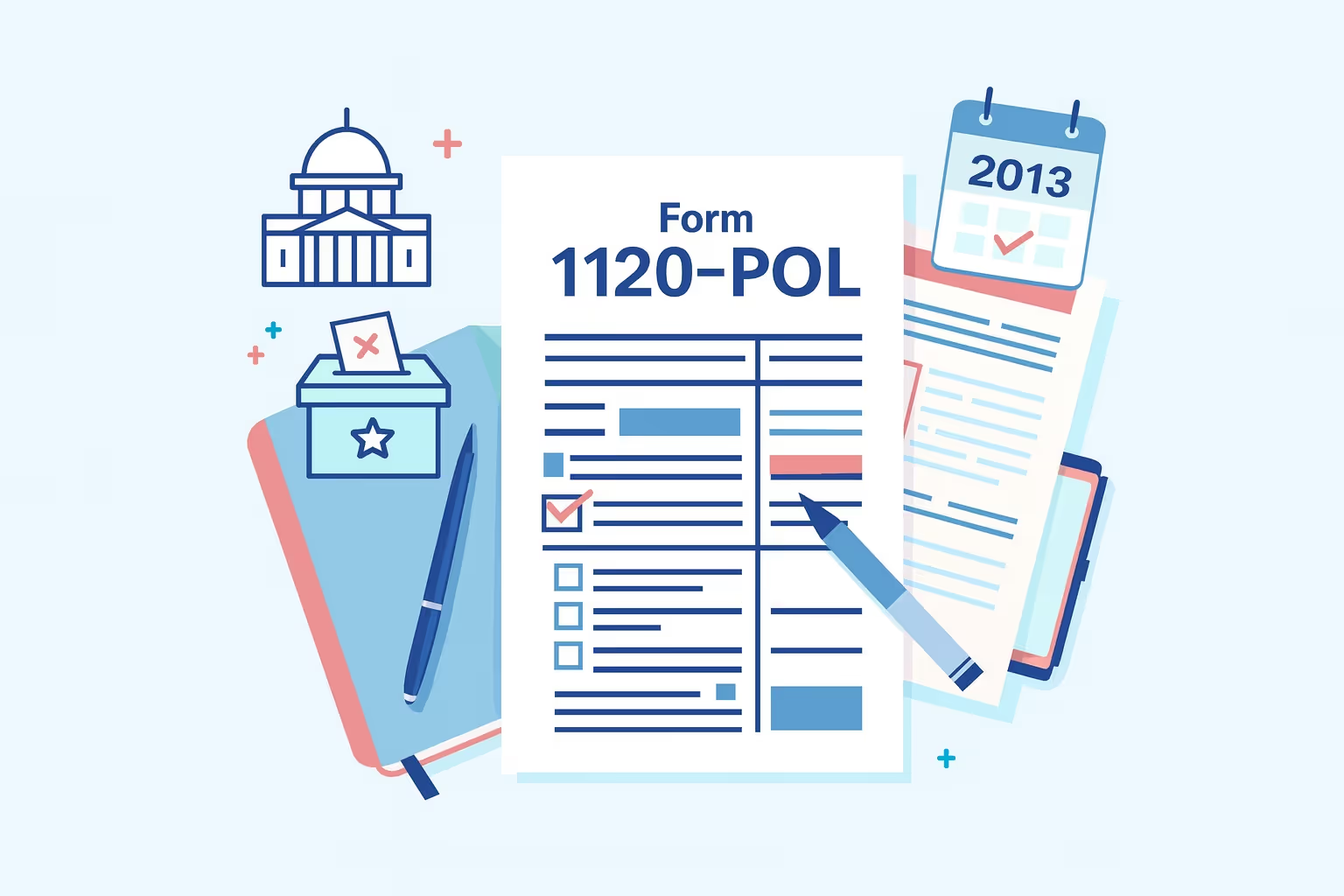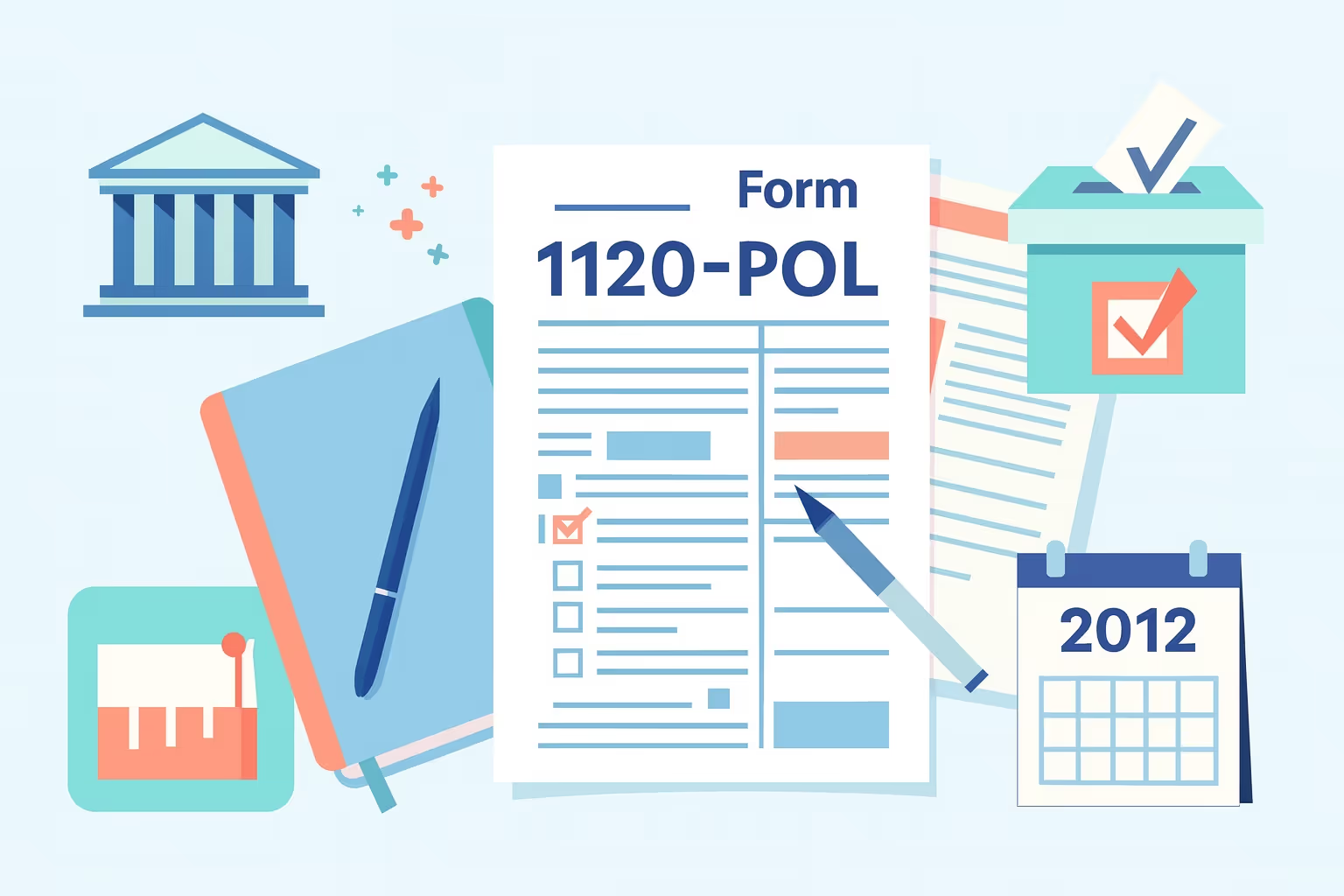
Filing Form 1120-POL is essential for political organizations that generate taxable income. This income tax return ensures compliance with Internal Revenue Service regulations and helps organizations meet their federal tax obligations. Understanding the form, deadlines, and filing methods can prevent errors and penalties that affect your tax status.
Nonprofit tax filing can appear complex when organizations deal with exempt and non-exempt income. Contributions and expenditures must be tracked carefully, with deductions applied only to taxable income. IRS instructions for the 2018 tax year outline what is required, and following them closely helps avoid rejected returns, unnecessary penalties, and delayed refunds.
This guide explains IRS forms, filing requirements, and step-by-step directions. It covers the due date, accepted filing formats, e-file advantages, and how to retransmit rejected returns. Organizations will also learn to manage documentation, review schedules, and ensure proper submission. The goal is to help organizations file correctly, avoid problems, and save time.
Understanding Form 1120-POL
Form 1120-POL, officially titled "U.S. Income Tax Return for Certain Political Organizations," applies to entities that must report taxable income outside their exempt function. The IRS requires reporting specific details for proper compliance and accurate tax liability calculation.
Who Must File
- Political organizations: Every political organization with taxable income must file Form 1120-POL, even if it normally qualifies as tax-exempt under section 527.
- Nonprofit entities with section 527(f)(1) income: An exempt nonprofit organization must file if it generates taxable income through political activities under IRS section 527(f)(1).
- General requirement: Filing Form 1120-POL ensures the IRS can verify reported income, expenditures, and deductions while preventing duplicate filings or missing returns.
Key Terms Defined
- Taxable income: Taxable income is the organization's gross income, excluding exempt function income, reduced by specific deductions allowed under IRS rules.
- Exempt function income: Exempt function income includes contributions, membership dues, and political fundraising proceeds that remain segregated for exempt use and are not taxable.
- Form approved: Only the official IRS form approved for submission should be used, since other versions may be rejected or create filing errors.
Nonprofit Tax Filing
Nonprofit tax filing requirements differ depending on how income is generated and how contributions are used. Political organizations must separate exempt income from taxable amounts and apply deductions properly.
Types of Political Organizations
- General organizations: General political organizations include committees, campaign groups, and parties that exist to influence elections through contributions and related expenditures.
- Newsletter funds: Candidates or officeholders maintain these accounts exclusively to publish, print, and distribute newsletters.
- Separate segregated: These are special funds maintained by tax-exempt organizations, created specifically to support political activities under IRS guidelines.
Filing Requirements
- Form accepted: Organizations must always file using the IRS version of Form 1120-POL, since other unofficial formats may not be accepted during processing.
- Return submission: Organizations must submit their returns by the IRS's due date and follow official instructions to avoid penalties and interest.
- IRS verification: The IRS reviews reported income and deductions to verify tax liability, reducing errors and problems that smaller organizations may encounter.
Political Organizations and Taxable Income
Taxable income for political organizations is determined by reviewing all gross income and subtracting allowable deductions. The IRS requires detailed schedules and supporting information for every reported amount.
Sources of Income
- Investment income: Investment income, such as dividends, interest, and rental payments, must be reported in full and counted toward taxable income totals.
- Capital gains: Capital gains from the sale of securities or property must be included in taxable income if not segregated for exempt purposes.
- Other income: Other taxable income includes improperly segregated contributions, business activities, or revenue that does not qualify as exempt under IRS rules.
Allowable Deductions
- Direct expenses: Direct expenses may be deducted only if they are directly related to producing taxable income, not to exempt political expenditures.
- Expenditure rules: Expenditures for campaigns, lobbying, or other exempt functions cannot be deducted when calculating a political organization's taxable income.
- Reported details: Each deduction must be supported by documentation, schedules, or attachments so that the IRS can verify its accuracy during review.
Due Date for Filing Form 1120-POL
The IRS sets a clear deadline for Form 1120-POL. Political organizations must file on time to avoid penalties and interest. The due date depends on whether the entity follows a calendar or a fiscal tax year. Late filing may result in a minimum penalty even if no tax is owed.
Filing Deadlines
- Calendar year filers: Political organizations that follow a calendar year must file Form 1120-POL by April 15 of the following year without exception.
- Fiscal year filers: Organizations using a fiscal year must file by the 15th day of the fourth month following the close of their tax year.
- Weekend rule: If the filing date falls on a weekend or legal holiday, the IRS automatically accepts the return on the next business day.
Step-by-Step Filing for Form 1120-POL
This step-by-step guide covers preparation, completion, and submission. It begins by confirming filing requirements, continues by completing income and deduction lines, and ends with assembly, payment, and submission.
Step 1: Confirm Filing Requirement
Determine whether the organization must file under section 527 or 527(f)(1). Review income sources, contributions, and expenditures to confirm that taxable income exists. Check IRS requirements and instructions for your type of organization. If unsure, ask questions early and document decisions. Establish responsibility for the income tax return and filing timeline.
Step 2: Set Tax Year, Due Date, and Address Details
Confirm whether you follow a calendar year or a fiscal tax year. Identify the due date, note April deadlines for calendar filers, and consider an extension with Form 7004. Verify the organization’s legal name, EIN, and address. Confirm the correct IRS processing center if mailing. Capture contact email for acknowledgments and questions about submission.
Step 3: Gather Records and Segregate Funds
Collect bank statements, investment records, and prior returns—separate exempt function income from taxable income to prevent later allocation problems. Assemble contribution logs, invoices, and receipts supporting deductions. Conduct a brief internal audit to verify figures. Open any needed accounts for segregated funds. Ensure security over records and share access only with authorized users.
Step 4: Fill Income Lines 1–8 Accurately
Report dividends, interest, rents, royalties, capital gains, and other income. Include improperly segregated exempt income in taxable totals. Match reported figures to statements and required schedules. Download the current IRS form and read each page of instructions. If numbers change, update entries and recheck totals. Keep details available for verification upon request.
Step 5: Enter Deductions Lines 9–16 With Allocation Support
Claim deductions only when directly connected to producing taxable income. Allocate mixed expenses between exempt and taxable activities using consistent methods. Keep worksheets to document allocation methods. Verify totals against source documents. Exclude campaign expenditures. Maintain documentation for every deduction type. Ensure documentation supports even small adjustments.
Step 6: Figure Tax, Credits, and Payments
Calculate taxable income after the specific deduction and apply the 21 percent rate. Review available credits, such as foreign tax credits, and adjust totals. Determine payments due and plan how to pay through EFTPS. Consider refund implications. Address penalties if late. Confirm accuracy before certification. Record the date calculations were finalized for internal tracking purposes.
Step 7: Assemble Schedules, Verify, and Review
Attach required schedules, including Schedule D, Form 4797, and Form 4562, as applicable. Place attachments in the recommended order. Review each figure, page, and signature field. Use company software or IRS fillable tools to reduce errors. Confirm that you are using the current IRS-approved form. Ensure that the review, corrections, and final sign-off are documented.
Step 8: Submit Electronically or Mail and Monitor Status
Choose e-file for faster acknowledgment and fewer errors, or mail if necessary. If rejected, correct the issue and retransmit rejected returns electronically. Avoid duplicate submissions. Forward confirmations to stakeholders and retain confirmations with records. Update the status until accepted. If unable to e-file, verify the mailing address, include all attachments, and track delivery time.
Money-Back Guarantee and Filing Support
Some companies offer filing assistance with a money-back guarantee. While the IRS does not provide refunds on filing fees, third-party providers may issue guarantees for electronic submission. Organizations should carefully review terms before relying on external services.
Considerations for Organizations
- Refund policies: Private companies that assist with nonprofit tax filing sometimes offer a money-back guarantee if the IRS rejects the electronic submission.
- Security measures: Before selecting a filing company, organizations should verify that the provider uses IRS-approved systems and protects user details during the process.
- Potential risks: Relying on external guarantees can create problems if the return is rejected, since the organization is still responsible for resubmission.
Internal Audit and Review
An internal audit is a recommended practice for any organization filing Form 1120-POL. It helps identify errors, verify expenditures, and ensure compliance with IRS requirements. Conducting a review before submission reduces the risk of penalties and processing delays.
Benefits of an Internal Audit
- Error detection: Performing an internal review allows an organization to find errors in schedules, deductions, or figures before these mistakes reach the IRS.
- Compliance check: Internal audits confirm that the return includes all required information, attachments, and schedules, which reduces the likelihood of rejection by the IRS.
- Future preparation: Regular audits allow organizations to update procedures, strengthen accounting records, and more effectively follow IRS instructions in future filing years.
Retransmit Rejected Returns
When a return is rejected electronically, organizations must retransmit rejected returns promptly. The IRS allows resubmission once errors are corrected. This process ensures the form is accepted and reduces the risk of penalties or interest.
Common Rejection Issues
- Duplicate submission: A return may be rejected if the same form was previously filed, since the IRS does not process duplicate electronic submissions.
- Incorrect figures: Rejection often occurs when reported numbers contain mathematical errors or do not match details in required attachments and supporting schedules.
- Missing schedules: The IRS rejects returns if necessary schedules, such as Schedule D or Form 4797, are not attached or filed with accurate details.
E-File Advantages for Political Organizations
The IRS encourages political organizations to e-file Form 1120-POL. Electronic filing provides faster confirmation, reduces errors, and speeds up refund processing. Organizations handling sensitive financial details often find e-filing more secure and reliable than paper filing.
Benefits of E-Filing
- Quick confirmation: Organizations that e-file receive an electronic acknowledgment when the IRS accepts the return, providing organizations with prompt confirmation and better security.
- Reduced errors: Electronic filing automatically detects common problems before submission, which helps reduce the number of rejected returns caused by avoidable mistakes.
- Faster refunds: Refunds are issued more quickly when organizations file electronically, since the IRS can process returns without delays caused by manual review.
Tax Year and Calendar Year Rules
Understanding whether to file under a calendar year or a fiscal year is critical. Most political organizations follow a calendar year, ending December 31. However, organizations may choose a different tax year if approved by the IRS. Filing requirements vary depending on the selected year type.
Yearly Filing Structure
- Calendar year: Political organizations that file using a calendar year must submit their return by April 15 of the following year without exception.
- Fiscal year: Organizations using a fiscal year must submit Form 1120-POL by the 15th day of the fourth month after their tax year ends.
- IRS approval: An organization that wants to change its tax year must obtain approval from the IRS before implementing a different structure.
Required Schedules and Attachments
Political organizations filing Form 1120-POL may need to include additional IRS forms and schedules. These attachments provide supporting details for taxable income, deductions, and credits. Attaching required schedules properly ensures processing accuracy and reduces the chance of rejection or delays.
Common Attachments
- Schedule D: Organizations attach Schedule D when reporting capital gains or losses, providing transaction details, and ensuring figures match the reported taxable income.
- Form 4797: This form is required if the organization reports gains or losses from business property sales, such as office equipment or buildings.
- Form 4562: Attach this form if claiming depreciation deductions, including information about property type, cost basis, and calculation method.
Supporting Documentation
- Other deductions: Supporting statements must list all reported deductions, including direct expenses, to allow the IRS to verify accuracy and proper categorization.
- Other income: Detailed explanations are required for amounts listed under other income, ensuring transparency and compliance with IRS filing requirements.
- Exempt expenditures: Section 501(c) organizations must attach statements explaining exempt function expenditures to document allocations and preserve compliance.
Common Errors and Penalties
Mistakes on Form 1120-POL may cause penalties, rejected submissions, or delayed refunds. Reviewing IRS instructions, checking figures, and confirming attachments can help political organizations avoid these problems. Penalties often apply for failing to file on time, underreporting taxable income, or making payment errors.
Common Errors
- Mathematical mistakes: Incorrect figures on income or deductions often cause rejection, requiring the filer to retransmit rejected returns electronically after correction.
- Improper deductions: Claiming campaign expenditures or exempt costs as deductible is not allowed and will result in penalties or IRS review.
- Late submission: Missing the deadline without an extension results in penalties, including a minimum penalty applied even if tax is not owed.
Penalty Types
- Late filing penalty: The IRS charges penalties for late submission, based on the time elapsed past the required due date.
- Late payment penalty: Organizations that fail to pay their full liability on time will owe penalties, plus interest, until the balance is paid.
- Accuracy penalty: The IRS applies penalties if an organization substantially underreports taxable income or fails to provide accurate schedule details.
Zero Activity and Dormant Years
Some political organizations may have years without taxable income. Although filing may not be mandatory, the IRS recommends that organizations file their returns regardless. Submitting a zero activity return starts the statute of limitations period, documents compliance and helps avoid future disputes during an internal audit or review.
When Filing is Useful
- Statute protection: Filing creates a record that begins the three-year statute of limitations period for the IRS to examine the organization’s return.
- Transparency: A dormant year filing shows the IRS that the organization remains compliant, even if no taxable income was earned that year.
- Recordkeeping: Zero activity filings help maintain consistency in the organization’s historical tax records and simplify future reporting when activities resume.
First-Time Filer Tips
Filing Form 1120-POL for the first time can be difficult, but following IRS instructions step-by-step helps organizations stay compliant. Setting up effective internal systems, segregating funds, and keeping accurate records make filing easier and help prevent errors, rejections, or penalties.
Practical Tips
- Pre-filing setup: To prepare for filing and electronic payments, obtain an Employer Identification Number, set up accounting systems, and enroll in EFTPS.
- Segregated accounts: To simplify recordkeeping and deduction calculations, keep separate bank accounts for exempt contributions and taxable investment income.
- Record retention: Maintain supporting documentation, including receipts, bank statements, and board minutes, for at least three years to verify details if questioned.
Frequently Asked Questions
When is the due date for Form 1120-POL in the 2018 tax year?
For calendar-year filers, the due date was April 15, 2019. For fiscal-year filers, the deadline was the fifteenth day of the fourth month after year-end. The next business day became the deadline if the date fell on a weekend or holiday. Filing extensions were possible, but the request did not extend payment deadlines.
Do political organizations need to e-file their Form 1120-POL?
Political organizations are not required to e-file, but the IRS strongly encourages it. E-filing reduces errors, speeds refund processing, and provides faster confirmation of acceptance. Paper filing remains acceptable, but electronic filing offers security and efficiency that political organizations benefit from, particularly when handling sensitive financial details or retransmitting rejected returns after corrections.
Are contributions and exempt expenditures taxable income?
Contributions, membership dues, and exempt expenditures segregated for political purposes are not taxable income if properly recorded. However, if exempt function income is not segregated, it becomes taxable and must be reported. Political organizations must ensure compliance by separating these funds in bank accounts and providing supporting details in schedules attached to the income tax return.
What happens if my organization fails to file on time?
Penalties may apply if a political organization fails to file Form 1120-POL on time. The IRS imposes a late filing penalty, a late payment penalty, and interest on unpaid balances. A minimum penalty is assessed if the return is sixty days late, regardless of whether tax is owed. Filing extensions helps, but they do not extend payment deadlines.
Can an organization retransmit rejected returns electronically?
If the IRS rejects a return, it must be corrected and retransmitted electronically. Common reasons for rejection include missing schedules, incorrect figures, or duplicate submissions. Organizations should carefully review IRS error messages, update the form, and resubmit through the file systems. This process ensures that the form is accepted without further penalties or delays.
What are the benefits of an internal audit before filing?
An internal audit helps identify errors, verify deductions, and confirm compliance with IRS instructions before submission. Organizations that perform internal audits reduce the risk of penalties, rejected returns, and compliance problems. Audits also prepare the organization for future tax years by updating processes, strengthening accounting systems, and ensuring that financial details are accurately reported on IRS forms.












